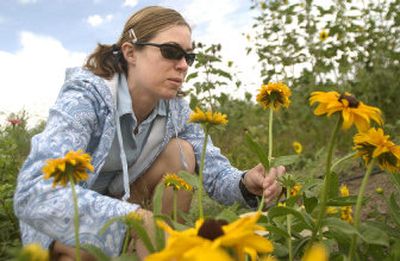WSU breaks new ground in organics

PULLMAN – You can tell when Julie Sullivan’s been doing her homework. Her hands are covered in mud.
“I know I’m filthy,” said Sullivan, standing in the midst of Washington State University’s organic teaching farm this week. “I’m always dirty.”
Sullivan’s earthwork has an academic purpose – she’s expected to graduate in December with the nation’s first bachelor’s degree in organic agriculture.
Washington State University just added the degree program. It’s the first American university to do so but probably not the last, given the speedy rise in sales and popularity of organic food.
“I love it,” Sullivan said last week, while planting oregano. “It’s the only thing I can see myself doing.”
When classes start Monday, four students will be enrolled in the new degree program, and officials hope it may grow to about 40. WSU soil science professor John Reganold, who developed the major, said it will produce graduates who can work in a range of jobs.
“The industry wants people to know how to market organic agriculture, know how to farm, know how to regulate and certify,” he said.
Reganold designed the program partly in response to interest from potential students and people in the organic farming industry who need trained workers, he said. But it also is a natural extension of his decades of research into the differences between organic and conventional farming methods.
“I’ve been doing these comparison studies since 1985,” said Reganold, who’s done side-by-side studies of wheat, fruits, wine grapes and apples. “I want to find out: Are there differences? Whatever the differences are, I report.”
Though conclusive science on the benefits of organic agriculture is limited, Reganold says that his work shows consistently that organic farming is better for soil quality, less contaminated with pesticides and other chemicals, and more healthful.
Some researchers argue that there’s no scientific basis for the belief that organic food is healthier – or even that pesticide use poses a health risk at the low levels used. Rutgers University food scientist Joseph Rosen, a frequent public skeptic regarding organics, has said in press accounts that consumers who buy organic foods are paying more for “wishful thinking” that unproven organic food is healthier.
But Reganold said scientific evidence is accumulating in favor of organic farming. He said some emerging studies show higher levels of vitamins and antioxidants, and others show that people find some organic fruits sweeter – which may suggest that organic crops are not just free of pesticides but are better for you in and of themselves.
In any case, organic foods have been the fastest-growing part of the American food market for several years – increasing by about 20 percent a year for the past decade, according to industry estimates.
While that’s still a small part of the overall grocery market – about 2.5 percent – no one expects it to slow down any time soon. Even Wal-Mart has announced it is expanding its organic offerings, and most supermarkets now carry plenty of such foods, Reganold said. “Organic may wind up being 20 to 30 percent of the market,” he said. “Why not?”
In the mid-1980s, Reganold did his first comparison study, monitoring a 900-acre organic wheat farm compared with a 1,200-acre conventional wheat farm. His study of the Palouse farms showed that the organic farm had more biologically active soil and less erosion.
He followed with studies of farming in New Zealand and California, as well as apple orchards in the Yakima Valley. Consistently, the organic farms had better soil quality and less erosion, used less energy and polluted the groundwater less, he said.
While some crops had lower yields – a major concern for some growers – others were roughly the same, he said.
Reganold emphasized that while he’s found consistent support for organic farming, he doesn’t approach his work as an advocate. His research has been published in prominent peer-reviewed journals such as Nature and Science.
“I’m a researcher,” he said. “I’m not trying to sell this stuff.”
The school’s organic farm, where Sullivan was rooting around this week, includes a wide range of vegetables, fruit and flowers on three acres at the edge of campus. Part of the new organic program will require students to work a summer on the farm.
Brad Jaeckel manages the farm and teaches in the program. An organic farmer in Moscow for about 10 years before going to work at the WSU farm, he oversees the production of the vegetables – which go to shareholders who buy into the farm and get regular vegetable bundles during the summer and fall.
“People are just getting more educated about where their food comes from and conscious about the food system,” he said. “As far as I’m concerned, there’s no question it’s the way to go.”
As for Sullivan, a 28-year-old from Olympia, she hopes to continue in the same kind of work she’s doing at the Pullman garden – running an organic community garden where people buy shares, known as Community Shared Agriculture, or CSA, gardens.
In the meantime, she enjoys her classes and working on the farm, along with some of the fringe benefits like access to fresh vegetables.
“As much as I want,” she said. “Within reason.”